ABRAHAM
JOSHUA
HESCHEL
ABRAHAM
JOSHUA
HESCHEL
THE CALL OF TRANSCENDENCE
SHAI HELD
INDIANA UNIVERSITY PRESS
Bloomington and Indianapolis
This book is a publication of
Indiana University Press
Office of Scholarly Publishing
Herman B Wells Library 350
1320 East 10th Street
Bloomington, Indiana 47405 USA
iupress.indiana.edu
Telephone orders 800-842-6796
Fax orders 812-855-7931
2013 by Shai Held
All rights reserved
No part of this book may be reproduced or utilized in any form or by any means, electronic or mechanical, including photocopying and recording, or by any information storage and retrieval system, without permission in writing from the publisher. The Association of American University Presses Resolution on Permissions constitutes the only exception to this prohibition.
 The paper used in this publication meets the minimum requirements of the American National Standard for Information SciencesPermanence of Paper for Printed Library Materials, ANSI Z39.481992.
The paper used in this publication meets the minimum requirements of the American National Standard for Information SciencesPermanence of Paper for Printed Library Materials, ANSI Z39.481992.
Manufactured in the United States of America
Library of Congress
Cataloging-in-Publication Data
Held, Shai, [date] author.
Abraham Joshua Heschel : the call of transcendence / Shai Held.
pages cm
Includes bibliographical references and index.
ISBN 978-0-253-01126-8 (cloth : alk. paper) ISBN 978-0-253-01130-5 (e-book) 1. Heschel, Abraham Joshua, 19071972Teachings. 2. JudaismDoctrines. 3. God (Judaism) I. Title.
BM755.H37H45 2013
296.3092dc23
2013022925
1 2 3 4 5 18 17 16 15 14 13
To the Memory of
Moshe Held,
My Father
CONTENTS
ACKNOWLEDGMENTS
I have accumulated a great many debts in the long and drawn-out process of producing this book. I wish to offer especial thanks to the following teachers, colleagues, students, and friends.
Professor Jon Levenson has been a significant teacher, valued mentor, and cherished friend for two decades now. My thinking in general and this work in particular have been immeasurably enriched by his incisive questions, consistently original insights, and keenly critical eye. This book began as a dissertation, and I could not have asked for a more supportive and responsive advisor. Let me state at the outset: any errors, oversights, or lapses in judgment in this work are Jons fault; any insights are entirely my own. Or something like that.
In recent years, Professor Michael Morgan has become an important teacher and a cherished friend. He is a philosopher in the truest sense of the word: a lover of wisdomand a wonderful person to boot. My thinking, on Heschel and on much else, has been deepened by our exchanges and conversations.
Ken Koltun-Fromm and Robert Erlewine were kind enough to offer extensive feedback on the manuscript. Bob and I have since had a productive series of exchanges, and my thinking and writing about Heschel have grown in clarity and sophistication as a result. He has also been producing some of the best, most insightful work about Heschel, and I am honored by and grateful for his support of my work.
Professor Arthur Green opened up the world of Hasidic texts for me, and he has been unflagging in his encouragement of my work. Art has also served as an important model for me in integrating a life of scholarship with a deep commitment to serving the Jewish community and the broader world. Professor Khaled Anatolios was a skilled guide through the landscape of Christian theology in the twentieth century. Jonathan Boyarin graciously allowed me to consult his unpublished draft translation of Kotzk: In Gerangl Far Emesdikeyt.
In very different ways and in very different registers, Rabbi Yitz Greenberg and Rabbi Louis Jacobs opened up the world of Jewish theology to me. They both taught me never to fear questions, and never to apologize for them. My debt to Yitz is boundless, and I am honored to call him my teacher. Bernie Steinberg has given more to this study, and to my understanding of my work in the world, than he knows; he has been a model and an inspiration in countless ways. Bill Lebeau taught me how to be a rabbi. Barry Mesch gave me my first opportunity to teach Heschel some two decades ago.
A variety of friends made important contributions to this work, sometimes through explicit conversations about content, but far more often through the sheer delights of friendship and mutual support. I will not mention them all, but I thank a few in particular who have, in ways direct and indirect, shaped the content and vision of this work: Yehudah Mirsky, David Starr, Steve Greenberg, Jeremy Dauber, Jeffrey Wechselblatt, Michael Kress, David Hoffman, Marcie Lenk, Or Rose, Shaul Magid, and Mark Nussberger.
Elie Kaunfer, Ethan Tucker, and Avital Hochstein have been partners in building Mechon Hadar, an institution that embodies many of the values I hold most dear; we have worked together with a remarkable and all-too-rare spirit of mentschlichkeit and camaraderie. In countless ways, our shared work delayed this project, and in equally abundant ways, their encouragement and support helped move it forward. To them, and to all of my colleagues at Mechon Hadar: my profound thanks.
The countless hundreds of students with whom I have studied Heschels writings and ideas have taught me more than I can ever hope to repay. Their often relentless questioning, their persistent challenges, and their frequently profound openness to new and provocative ideas have again and again inspired me to dig deeper and think harder. Thanks to all of you, and to each and every one of you.
Librarians (especially interlibrary loan librarians) at Harvard, Columbia, and Brown Universities, as well as at the Jewish Theological Seminary and Union Theological Seminary, have been patient, helpful, and resourceful. My thanks to them all.
Jaclyn Rubin and Gabriel Seed served as research assistants at various stages of my research, and I am grateful to them, both for their industriousness and for their mentschlichkeit. I am also thankful to Jaclyn for asking me questions, and then asking me some more, and then, well, you get the picture. Abby Phelps and Rachel Scheinerman provided extremely useful first rounds of copyediting with abundant good cheer. Rachel Druck also cast a careful eye on early drafts of several chapters.
Dee Mortensen, Sarah Jacobi, June Silay, and Dave Hulsey of Indiana University Press have shepherded the book to completion, and Eric Schramm provided meticulous copyediting. Rabbi Ben Kramer painstakingly prepared the index. I am grateful to them all.
My in-laws Bill and Francine Krasker have provided crucial support in a variety of ways, and I am profoundly in their debt.
My sister Dalith and brother-in-law Zeev have loved me and my family unconditionally, and it has meant more than I can say.
It is difficult to know what to say about Rachel, Lev, and Maya. I can imagine no greater blessing than the opportunity to share a life and a home with Rachel, one of the kindest and gentlest human beings one could ever hope to know. Rachels love is my lifes greatest privilege; her sense of humor and her generous tolerance of mine (most of the time, anyway) are among my lifes treasures. Being with Rachel and Lev and Maya each day fills me with a sense of peace and wholeness like nothing I have ever experienced before. Lev, now three, and Maya, now one, teach meday after day and hour after hourabout wonder and responsiveness (and about transitive concern), not to mention joy and laughter. May you, Lev and Maya, grow to embody the best ideals discussed in this work, and may you never let your capacity for wonder and gratitude wither or fade.


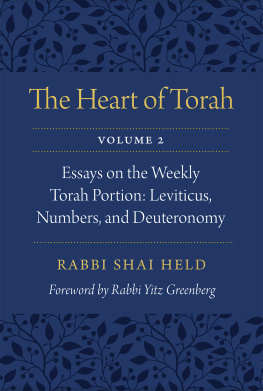
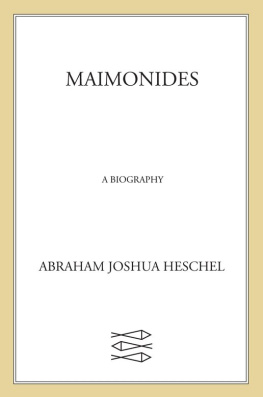
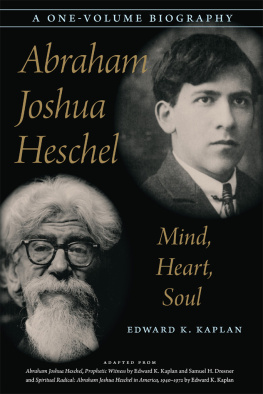
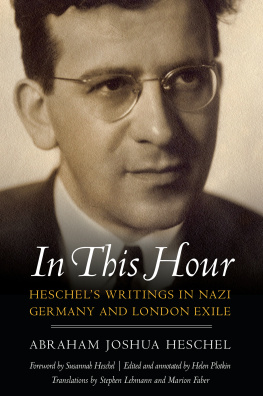
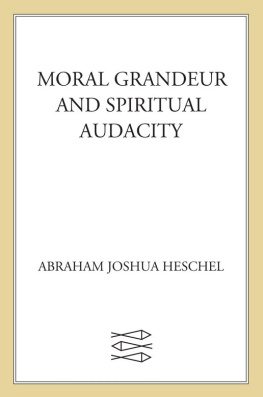
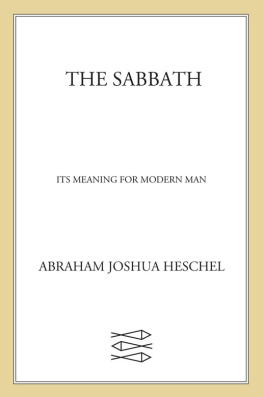
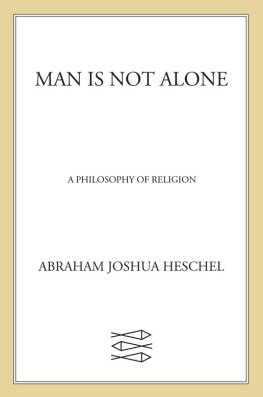
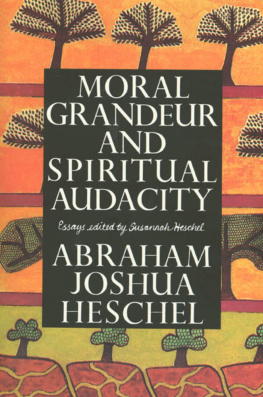
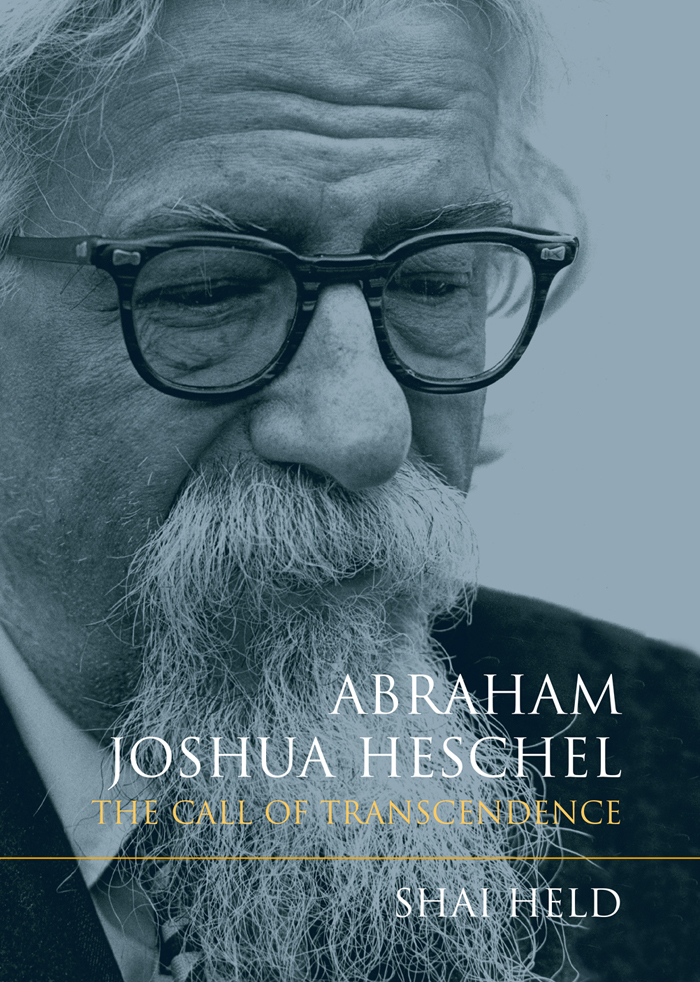
 The paper used in this publication meets the minimum requirements of the American National Standard for Information SciencesPermanence of Paper for Printed Library Materials, ANSI Z39.481992.
The paper used in this publication meets the minimum requirements of the American National Standard for Information SciencesPermanence of Paper for Printed Library Materials, ANSI Z39.481992.